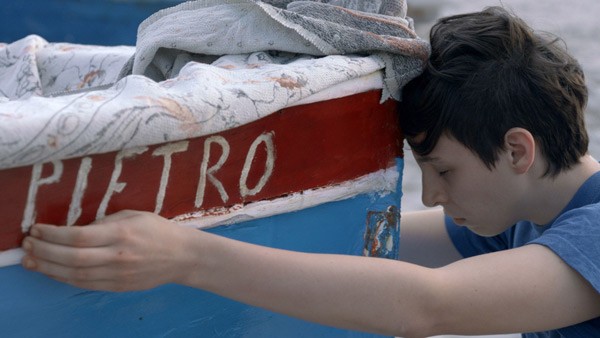 MIRIAM KARLKVIST IN SOUTH IS NOTHINGMafia pressure leads to heavy brooding in this youthful debut
MIRIAM KARLKVIST IN SOUTH IS NOTHINGMafia pressure leads to heavy brooding in this youthful debutThis moody, impressionistic Italian debut features a rebellious tomboy in Reggio Calabria who eventually learns that her fish vendor dad has been targeted by the Mafia. The relentlessly plain 17-year-old Grazia (the Italo-Swedish Miriam Karlkvist) gets lots broody silent moments. The filmmaker likes showing her swimming underwater; one of the times she seems to have seen the ghost of her missing brother. Her father Cristiano (Vinicio Marchioni) has a shop selling dried cod. Then the local Mafia boss drops by with a present and a firm recommendation: sell your shop (to the Mafia that is) and leave with Grazia for the North. He is noncommittal and ambivalent. He wants to resist, but the very fact of this situation makes him want to get out as soon as Grazia passes her state exams. There's the superstitious grandma, Cristiano's mom. There's a brother, Pietro, whom Grazia seems to worship, judging from how she treats his rowboat like an altar. He is gone. There is a religious service where he's remembered which for some reason grandma skips. It turns out his absence is mysterious. Grazia thinks she has seen him in a traveling carnival talking to Carmelo, (Andrea Bellisario), whom she therefore befriends, roughly, and they seem to bond. After half an hour we may begin to wonder why these people are so sullen and abrupt? The style can be grating at times; but Mollo follows through with conviction and good moments save this from being a mere exercise in Italian miserabilism. The actors are committed and Karlkvist, who acts her head off even if it's awfully one-note, got a European shooting star award for her performance.. Mollo doubtless knows what he is doing, but if yone looking for action or payoffs you'll walk out after the first reel. Mollo wants to make us uncomfortable, and at the same time, to enchant us. It's a tough game.
An effective contrast is achieved with a big city-wide religious festival with a giant heavy shrine topped with a gold crown, masses of men garbed in red, ecclesiastics in white robes, crowded streets, and fireworks. The warm earth tones of this authentic night footage into which Grazia is woven contrast with the blue-tinged action that's come before as if to say Grazia and Cristianio's world exists on the lifeless fringes of the pulsing heart of Calabria, where it's the Mafia and the Church that make everything happen.
This film hasn't so much a plot as a series of pouty gestures. Cristiano and Bianca (Valentina Lodovini), of the shop across the way, don't have a realtionshiop: she just grabs a couple of kisses and he pushes her away. Cristiano doesn't make a conscious decision about the Mafia pressure: he just grabs two sets of keys and smacks them down on a counter top.
Grazia and later even Cristiano seem to see the missing Pietro (Giorgio Musumeci), though Cristiano tells Grazia "they shot him." What
did happen to him? Maybe the Mafia "disappeared" him for some reason. We never know. The mood of anger and despair paralyzes the action. Grazia seems incapable of answering a single question at her orals, so passing her exams isn't in the cards. Carmelo develops a physical attraction to Grazia, which she rejects, but eventually they do get it on in Pietro's boat, making the event feel almost incestuous. Cristiano has turned the keys over to the Mafia boss's wife, but Grazia is unwilling to leave. What will happen to them? We never know. Things slide from brutal fact into comforting (but unconvincing) magic realism and the screen fades to black.
The cinematographer Debora Vrizzi and director and other members of the film crew are recent graduates of the Centro Sperimentale di Cinematografia of Rome, as is first-timer Andrea Bellisario. The film has an air of experimentalism and youth about it.
South Is Nothing/Il Sud è niente, 86 mins., in Italian, debuted at Toronto Sept. 2013 and has shown at big fests, Rome, Berlin, Tokyo. Is was screened for this review as part of the 2014 San Francisco International Film Festival (24 Apr.-4 May).





